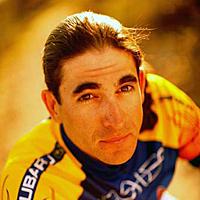
Recently on Cyclingnews.com |
An interview with Nat Ross, March 25, 2006
Going the distance
As a six-year professional mountain biker who's competed in twenty-eight solo 24-hour races, you'd think that ultra-endurance racing has consumed every waking hour of 35 year-old Nat Ross' adult life. But as Steve Medcroft discovers, the lean, long-haired and laid-back Coloradoan has a more complete resume than even the most upwardly-mobile corporate go-getter.
For starters, Ross holds a biochemistry degree from Western State College in Gunnison, Colo. After college, he pulled a five-year stint as high school teacher and coach. He also built Tough Guy Productions, the company that puts on the Arapahoe Basin based Telemark Freeskiing Championships and has produced five editions of the Total Telemark extreme ski movies. In 2005, he even took a swing at mountain-bike race promotion; designing the course for Sleepless in the Saddle.
The most impressive thing about this list of accomplishments is that he's built it at the same time as he's developed a world-class endurance resume that includes one solo national championship, a number of key individual wins, and top placements in races like Montezuma's Revenge and the 24 Hours of Moab.
"I suddenly had the ability to go with any and all attacks last year."- After years of self-coaching, Nat Ross says he is now realising the benefits of having a coach |
So how does he find the energy to put all of these different and demanding tracks together? The answer is a story that started in Hot Sulphur Springs, Colorado; a small town right on the Colorado River between Winter Park and Steamboat where Ross ran track and skied as a child. "I was a runner all the way to college," Ross says. "My specialty was the 400 and 800 meter along with the mile relay. I've always been a competitive skier too; I was the 1990 Colorado State Champion and a two-time All-American NCAA Division I XC racer."
But is his love for mountain biking that brings him to the pages of Cyclingnews. "If you consider a big wheel a bike than I started raging on the bike when I was very young," Ross says. "I rode bikes in the neighborhood with my friends all the way through grade school. But when I turned fourteen, things got serious; the Winter Park Ski Team put in an order of mountain bikes to help the athletes stay in shape through summer."
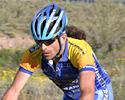
|
Ross says he would take off of endless rides out the regions hundreds of miles of dirt and forest-service roads. "I climbed fire roads and explored areas that we snowmobiled in the winter." He says he'd do these rides in cut-off shorts and sleeveless tee shirts with a fanny pack and a Blackburn rack 'loaded with crap'. "I didn't even have shorts with chamois when I was riding my road bike back and forth to and from school." (A 22-mile round trip.)
All that riding needed an outlet and Ross lined up for his first race at Tippary Creek in Winter Park, Colo. In 1987. "I finished a surprising second. After that, I was a racing machine."
He tried his first longer-format racing in 1998. "My first endurance race was Rage in the Sage. I bonked so hard," he laughs, "I couldn't even finish. I even had to walk my bike back to the venue." The next time he tried endurance racing, he had better success; placing second at the Montezuma's Revenge 24 hour race in 1998. "Since then, I've raced three or more 24 hour races each summer."
Today, Ross races for the Subaru / Gary Fisher mountain bike racing team, exclusively riding Fisher's 29-inch wheeled bikes. We caught up with him during the last week of February. He'd just completed long and rainy winter training ride.
Cyclingnews: You're 35 now and about to do your thirtieth 24-hour race, how do you feel your career as an endurance racer is going?
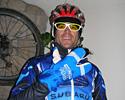
|
Nat Ross: Excellent. And they keep on getting better and better. The fitness has been improving. And since I started working with CTS (coach Jim Lehman) and training year round, and training specifically for endurance events, I've had really consistent and solid results. I started coaching three years ago and now I have a five-year goals for my racing.
CN: Bike-specific training in winter is a different approach than your normal ski in winter, ride in summer routine?
NR: It is different. So is the fact that I've always been my own coach too for the most part and never learned to get out of that comfort zone. That's why I like endurance racing. It forces you to accept being uncomfortable, to challenge yourself to work through long-lasting, nagging pain.
CN: Why did you feel it was necessary to turn to coaching after so much time doing it your own way?
NR: You have to be fast in endurance racing now; you can't just go a long time. I also wanted to be fast in the shorter races. And training will help me race more than just three endurance races in a year.
CN: What are the biggest adjustments you had to make when working with a coach?
NR: The hardest part for me has always been to do the speed component within the workout. I'll bust out the hours; if he says I need to do four hours at a certain cadence, I have no problem. It's the intervals within that four hours that I have the hardest time doing.
CN: Hard time disciplining yourself or too physically demanding?
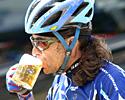
|
NR: A hundred percent discipline. It's so different from what I'm used to.
CN: Have you seen the work pay off in your racing?
NR: Yes. I suddenly had the ability to go with any and all attacks last year. I remember that Chris (Eatough) was attacking at Spokane (U.S. 24 Hours Solo Nationals). He attacked Tinker (Juarez) and I probably eight or nine times and I was able to go with all those attacks. I got it at that moment; why we were doing the work that we were.. Since then, I've even been able to make attacks on my own. And just being strong enough to recover quickly and do another race has been huge for me as well.
CN: Have you mapped out a season for yourself?
NR: I have four to five 24's on this year's calendar. The first one is in Spain in March. That's pretty exciting. It's in the region of Coin. They don't have a lot of 24 hour racing right now but they've got great stuff to ride on. I'm going there to try and help grow the sport.
CN: What's after Spain?
NR: I have several quick stops. I'll be at Sea Otter racing the omnium. I'll be doing a lot of road stuff as well. Now that I have a coach, he'll use that to get me faster. I'll do the Vuelta de Bisbee and Tour of the Gila. Some day I'd love to add the Tour of California to it.
CN: You're still Fisher sponsored and you're on your third year racing their two-niner format bikes?
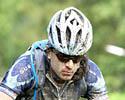
|
NR: The great thing about that platform now is that Jeremy (Horgan-Kobelski) is on board with it. Which is driving Rock Shox and Bontrager to build lighter, smaller stuff for it and that standardization for 29" wheels is coming together. That's always been the hardest part for me; I always felt that the stuff for two-niners was rideable for 24-hour racing but not the greatest it could be for shorter, faster races. I felt like the bike had a weight penalty for shorter races.
CN: How involved are you in the product itself?
NR: Quite a bit. I started out when all they had was the hardtail (Supercaliber). Then I worked with them on the Sugar platform. I helped do the Race Day platform in the beginning - Ryder started the 26" specs on it and I helped on the 29". We're constantly making refinements.
CN: What keeps you in the sport and wanting to go further with the sport rather than settling for your past accomplishments?
NR: The new growth into the sport is awesome. There have been a lot of new riders coming in. It's cool because it's not the same four or five guys duking it out against each other. There are new races popping up all over the place too.
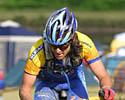
|
CN: If you had to classify yourself, what kind of a rider are you?
NR: I'm more of an endurance specialist right now I guess you'd say but I'm trying not to pigeonhole myself into the 24 hour. I want to do every single race that everybody would says they would do some time in their life. I not only want to do it but I want to get on the podium doing it.
CN: What are the races still on that list you haven't even tried yet?
NR: Trans Rockies is one. This will be my first year doing the Trans Alps. I've never done La Ruta, Cape Epic or the Crocodile Trophy. All these races have great reviews and high caliber racers. Now you can see why I have at least a five year timeframe for my racing career.

